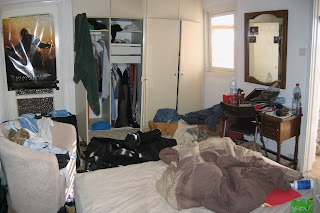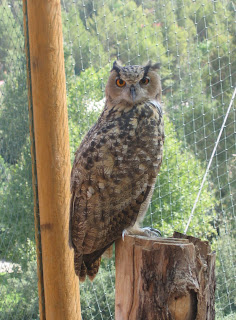So, though this is not in the spirit of the holidays and their value, I will try to quickly go over the biggest holidays of the year and some other stuff as quickly as possible while retaining whatever particularly interesting things happened.
I was in Ma'ale Adumim for both Rosh HaShana and Yom Kippur. RHS was good, my family (for simplicity's sake though they are not related - sister of an uncle through marriage) follows Sephardic custom and so the beginning of the meal was a bit more involved then the "just dip the apple in the honey (to represent a sweet new year)" that I'm used to.
There were a number of symbolic foods, all of which had a particular blessing before them and represented a certain value that we hope for in the new year. A lot of not falling to our enemies, strengthening ourselves, and so on. Of note was the the fish's head (filled with gefilte fish - which i thought Sephardim didn't eat) which was to symbolize that "we be as the head and not as the tail" i.e. from Deuteronomy/Devarim דְּבָרִים ("things") where it says "And HASHEM shall place you as a head and not as a tail..." which is paraphrased by a commentator as "as a mighty one and not as a weakling." Other than that the holiday involved getting up for 7:30 shul, early starts on holidays and shabbat is one of the few things I can't say I love about this country though there are values to it.
Yom Kippur was somewhat disappointing. Don't get me wrong, family was good, shul was good, break fast was good, and the fast was relatively easy. That said, Chabad at my school does a really really great job with services. It feels very intense and meaningful there. You'd think that upstate would have nothing on Israel but it is what it is. Perhaps I wasn't plugged in right.
Interesting about YK in Israel is that it is also called, by some, the Day of the Bicycle. During YK even many many secular Israeli's practice in some way. There is so little automobile activity (and in some areas none) that kids, one day a year, can ride their bikes freely throughout the streets. After services Friday night (YK is the only fast day allowed to take place on shabbat, all others are postponed until the next day or made early when they fall on shabbat) everyone was out, walking, talking, riding (mostly kids under 13 who don't have to fast), etc. It was another Israel moment - a mix of emotions - although I can't say I loved people doing many things prohibited by the holiday it was also something to see streets so empty of traffic and to see so many Jews involved in the heritage in some way.
There was an end of ulpan picnic Sunday which was nice and I was particularly impressed by Hiba, an Arab-Israeli in our class, who brought us a package made up of layers and layers of newspapers. Every other layer there was a small prize covered with a piece of paper on which was a question to answer. We all one some cute key chain or other, it was very very thoughtful.
Monday was the final from 8:30-12. We'll see how I do but assuming I pass I'll be able to advance to the next level of ulpan during the first semester (Gimmel, the 3rd level of 6, something like high intermediate or low advanced).
I went to friends' subletted apartment in the German Colony Wednesday night (sprinted in Naot to catch the last bus - thank Gd, maybe because of the holiday- he stopped for me, which is unusual a country of often rude bus drivers.
Walked an hour each way to a neighborhood next to the New Gate of the Old City. We attended a sukkot meal/party of about 40 young Americans. It was really nice. Plenty of food and I spent a lot of time speaking with a guy, also staying with my friends, who is currently in the army through Machal after studying at Haifa for a year (Don't worry guys, I'm coming home). I picked up a few tips for my friend B who is going in a month or so. The two interesting ones were to tell him to go to his induction with facial hair. At BAKUM, the base where soldiers are drafted and set up, you are given a photo ID. In the army you have to be cleanshaven and my friend told me that sometimes the commander would walk around scratching people's chins to see if they had stubble, then make them shave if they did. In any case there is a loophole, religious soldiers who feel the need to have a beard can get an exemption. Thing is, you have to kind of prove to them that you want/need a beard so... they look at your ID picture. Now my friend with whom I was speaking is not religious but he got it anyway. "One of the little things that makes your life much easier." The other thing was to pray three times a day (as Jewish men are supposed to) no matter religious or not, "its a great way to start your day, reflect and recenter yourself, and avoid [having to practice clearing your gun from any possible jam]."
Sukkot here is great so far. Its the first holiday I've been able to get into. I went to Geula and spent hours picking out arba minim (which was a bit much, but part of the experience i guess) and while traveling around during the week I love noticing how many people have sukkot up. Everywhere. Someone quoted another person as describing it like this "At home we have maybe
Of course I want to build in some message for the holiday. Ezra mentioned that many people loved the sukkah at his place, it was built using colorful tapestries for walls, its floor covered with patterned mats, and decorated with "trippy" pictures and artwork. He had been asked about certain changes that might be made, making the sukkah circular instead of rectangular, and noted that there were restrictions to building a sukkah including that it have a square or rectangular shape. Many people complain about the restrictions that shabbat, various holidays, and religious life in general come with. However it is possible to focus, instead of on the restrictions, on the opportunities that we have while dealing within the framework of these rules (if we cant watch TV, or go to the mall we have to spend time with family, talking, sharing, thinking). In the same way he was able to build a beautiful sukkah that people love AND work within the requirements of Jewish law we can build an amazing lifestyle while working with restrictions. We should all have a beautiful Sukkot holiday, filled with family and friends, and get the meaning of the holiday and be built from it.
One more thing, on the cab ride back from HaMoshav HaGermanit (German Colony) I spoke with the cab driver about how his sukkot started, where he was from (Maale Adumim!), and managed to get something of a compliment on my Hebrew!!!!





